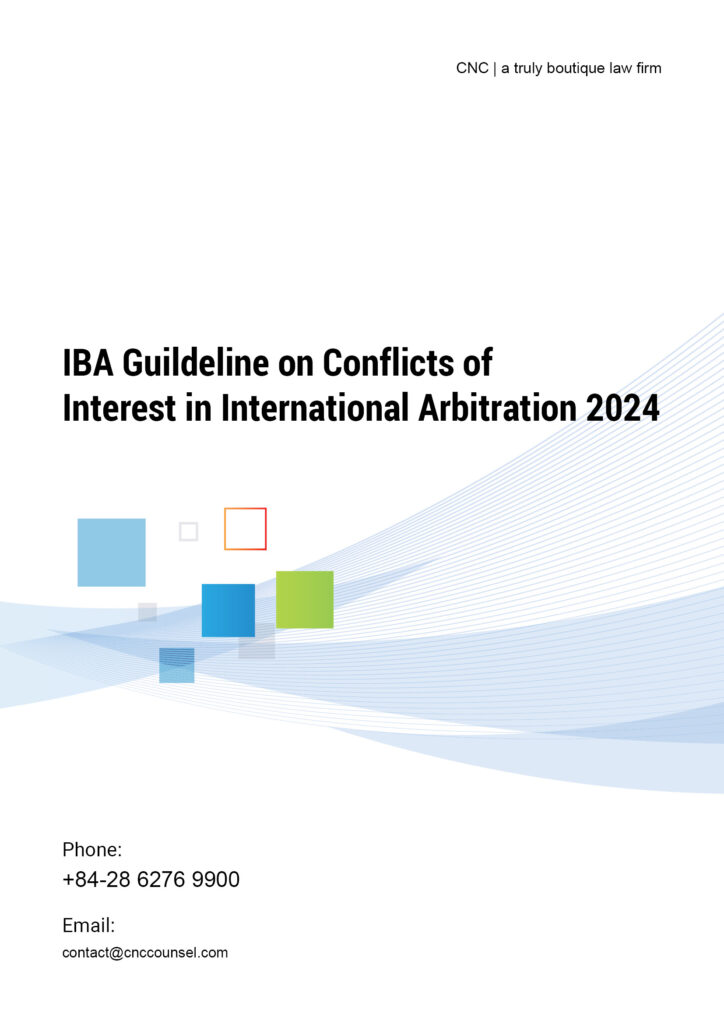IBA Guildeline on Conflicts of Interest in International Arbitration 2024
The International Bar Association (IBA) has issued a set of rules and guidelines to support the effective resolution of disputes through international arbitration. These rules and guidelines are applied to enhance transparency, fairness, impartiality, and efficiency in arbitral proceedings.
Within the scope of this article, CNC will provide clients with essential information regarding the IBA Guidelines on Conflicts of Interest in International Arbitration, one of the key guidelines that contribute to improving the effectiveness of resolving commercial disputes both domestically and internationally.
General Introduction to the IBA Guidelines on Conflicts of Interest in International Arbitration
The International Bar Association (IBA) is the world’s leading international organization of legal professionals, established in 1947 with the mission to protect and promote the rule of law globally. Among its activities, the IBA regularly organizes international events and publishes rules and guidelines aimed at enhancing the effectiveness of legal practice in real-world contexts.
The IBA’s rules and guidelines are not “law.” As such, they cannot replace any existing national legislation or arbitral rules chosen by the parties[1]. However, they are regarded as an important supplementary source in arbitral proceedings, helping to improve the efficiency of arbitration. Since their first issuance in 2004, the IBA Guidelines on Conflicts of Interest in International Arbitration have been widely recognized in the global arbitration community[2].
One of the fundamental principles of arbitration is that arbitrators must be impartial and independent. Therefore, the IBA Guidelines on Conflicts of Interest in International Arbitration (hereinafter the “Guidelines”) were drafted and issued to provide detailed content on the principles of fairness and independence. The Guidelines are applicable to both commercial and investment arbitration[3] and served as a source of reference for arbitrators, disputing parties, legal counsel, and legal experts in assessing an arbitrator’s independence and impartiality during the proceedings.
To ensure their continued relevance, the IBA Arbitration Committee has decided to review the Guidelines every ten years, drawing on practical experience and making revisions to improve their effectiveness. The most recent revision was adopted by an IBA Council Resolution in February 2024, introducing several notable changes compared to the previous 2014 edition.
Aside from the general introduction, the 2024 Guidelines retain the two main parts: Part I – General Standards Regarding Impartiality, Independence, and Disclosure, which elaborates on seven general standards, and Part II – Practical Application of the General Standards, which lists examples of disclosure requirements or disqualification of arbitrators.
The primary objective of the IBA Guidelines on Conflicts of Interest in International Arbitration is to establish a framework for ensuring fairness and independence in international arbitration[4]. The Guidelines focus on developing general standards concerning impartiality, independence, and disclosure in order to promote a consistent approach among involved parties when faced with actual or potential conflicts of interest[5].
General Standards under the IBA Guidelines on Conflicts of Interest
The 2024 IBA Guidelines on Conflicts of Interest have been significantly revised to introduce notable positive changes, with a particular emphasis on the shared effort to ensure that arbitral proceedings are transparent, fair, and independent, as well as to facilitate the smooth resolution of disputes. The objective of the Guidelines is not limited to outlining the duties of arbitrators but also reflects the important role of counsel and other involved parties in achieving a fair resolution of disputes.
Part I of the 2024 IBA Guidelines clarifies the general standards on impartiality, independence, and disclosure through annotations and detailed explanations of seven general standards, including:
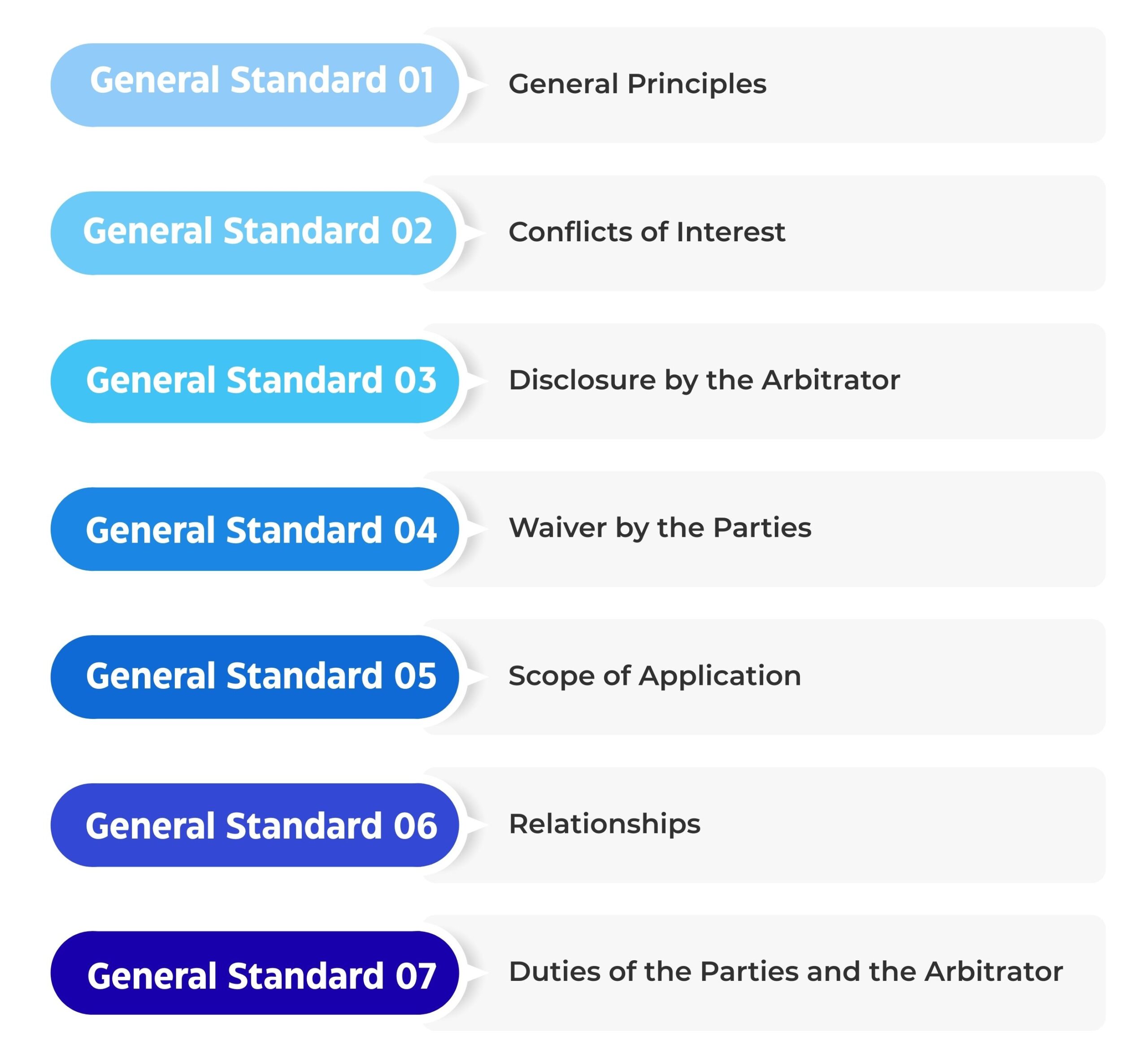
07 general standards under the IBA Guidelines on conflicts of interest
General Standard 1
General Standard 1[6], the overarching and foundational principle, must be observed by arbitrators throughout the entire arbitral process, including during the period for correction and interpretation of the final award. An arbitrator’s obligations only cease in one of the following circumstances:
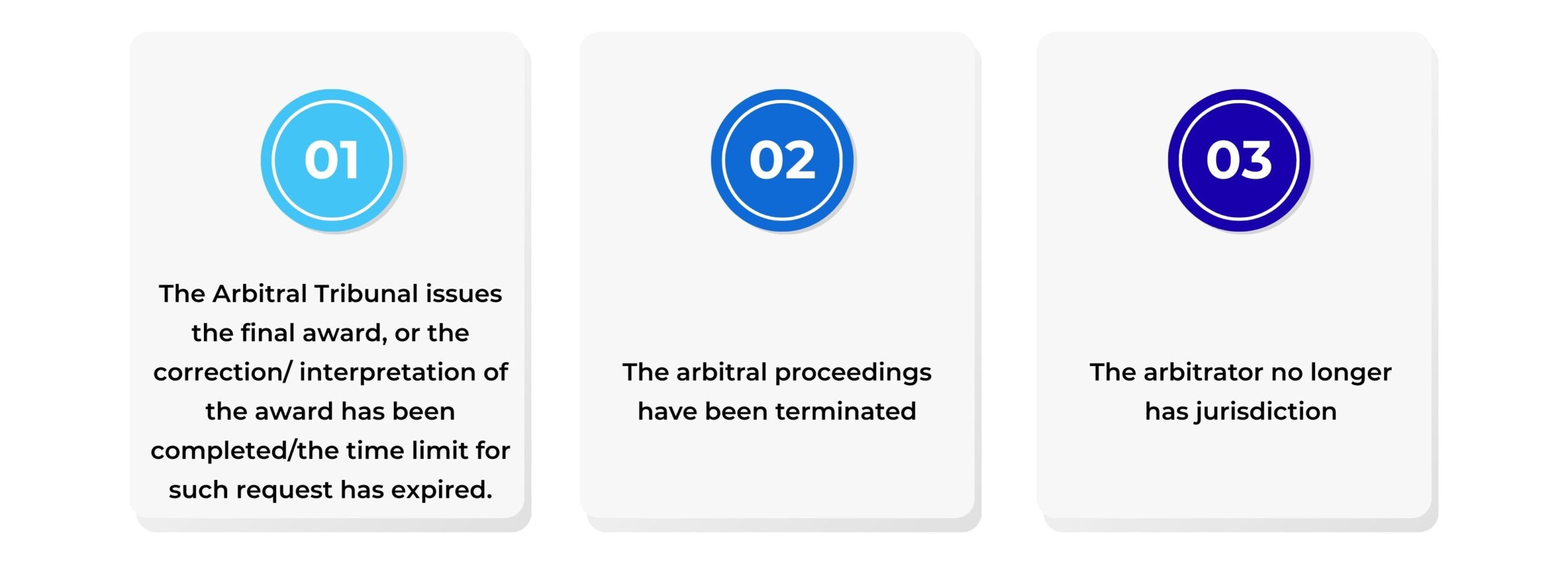
Circumstances ceasing an arbitrator’s obligations
In cases where, following the award annulment proceedings or other similar procedures, the dispute is remitted to the same arbitral tribunal, a new process of disclosure and review of any potential conflicts of interest must be conducted.
Notably, General Standard 1 in the Guidelines has been amended to clarify that the duty of impartiality and independence under this Standard does not apply during the period in which the award may be challenged before any court or competent authority (such as an ICSID ad hoc committee). This amendment provides greater clarity and certainty, allowing arbitrators and parties to be assured that the obligation ends once the arbitral tribunal renders its final award. However, it is important to note that the duty continues to apply during the time allowed for the correction or interpretation of the award under other applicable rules.
General Standard 2
General Standard 2 explains conflicts of interest by providing certain contexts for making determinations on this matter[7] as follows:
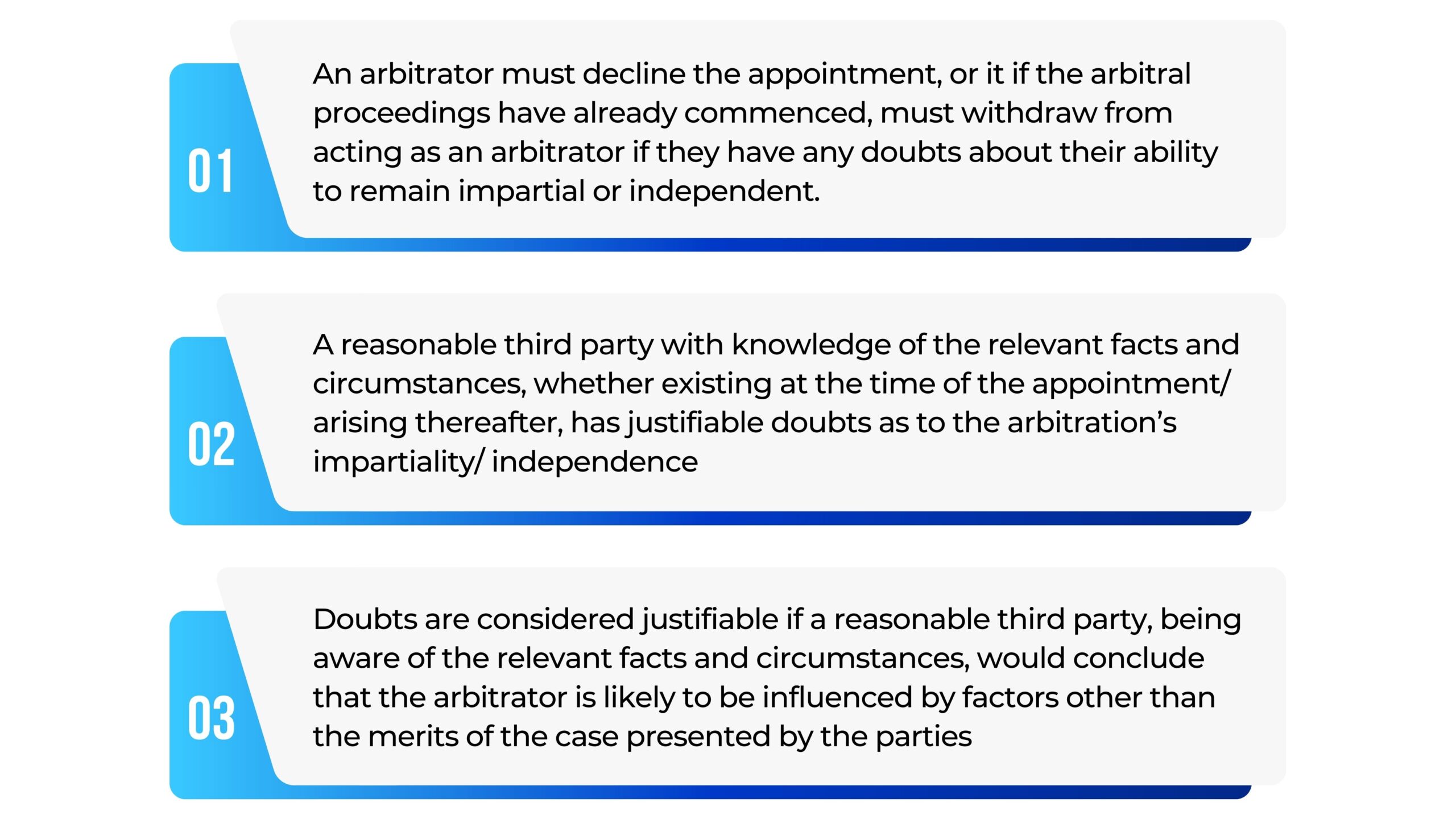
The standard of conflicts of interest
This Standard also applies at any stage of the arbitral proceedings, and the assessment of whether an arbitrator should be disqualified must be conducted objectively (with the arbitrator performing a self-assessment to meet the “reasonable third person test”). Specifically, a “reasonable (third) person” does not refer to an actual third party but is a hypothetical construct used to describe someone who would make a decision in line with generally accepted societal norms.
In addition, doubts about an arbitrator’s impartiality or independence are considered justified when they arise in situations described in the Red List under Part II of the Guidelines. The amendment to General Standard 2 provides a clearer distinction between situations on the Non-Waivable Red List and those on the Waivable Red List. Under the new provision, if an arbitrator has previously advised a party but did not receive significant income from that work, they may only be required to disclose the information under the Waivable Red List rather than be disqualified under the Non-Waivable Red List.
General Standard 3
General Standard 3 sets out the arbitrator’s disclosure duty. Where there exist facts or circumstances which, in the parties’ view, could give rise to doubts as to the arbitrator’s impartiality or independence, the arbitrator must disclose such facts or circumstances before accepting the appointment or as soon as they become aware of them[8].
The purpose of this Standard is to protect the parties’ interests by ensuring they are fully informed about matters that may raise doubts concerning the arbitrator. However, in certain situations described in the Green List, disclosure is not necessary.
Disclosure does not constitute an admission that a conflict of interest exists; rather, it enables the parties to assess and decide whether to proceed with the appointment. By making a disclosure, the arbitrator affirms their impartiality and independence, and invalidates the presumption that they are unqualified.
Nevertheless, arbitrators should consider applicable professional conduct rules before making any disclosure and may choose to withdraw from their role if disclosure would be inappropriate.
General Standard 4
General Standard 4 of the Guidelines concerns waiver by the parties. A party will be deemed to have waived any potential conflict of interest if it fails to raise an objection within 30 days from the date it became aware of the relevant facts or circumstances.
A person may not serve as an arbitrator where a conflict of interest exists as described in the Red List. However, they may still accept the appointment or continue to act as an arbitrator if the following conditions are met:
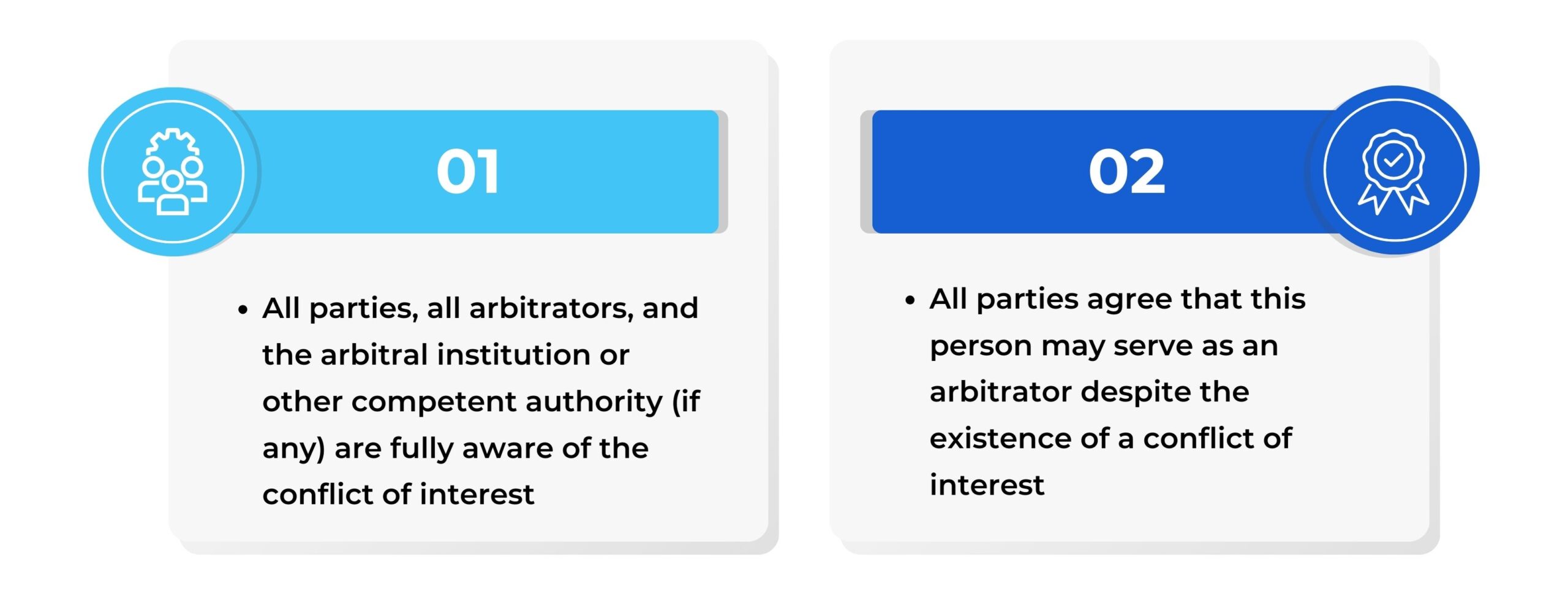
The standard of waiver by the parties
Thus, regardless of the seriousness of a conflict of interest, if the parties are aware of it and agree to accept the arbitrator’s appointment, that arbitrator may still participate in the proceedings. This reflects the principle of respecting the parties’ autonomy in choosing arbitration as their dispute resolution method.
General Standard 4 has been supplemented to clarify that if a party could have discovered facts or circumstances giving rise to a potential conflict of interest through reasonable inquiry, that party will be deemed to have known of such information. This provision effectively incorporates the concept of “constructive knowledge” when determining whether a party has waived its right to object to a potential conflict of interest.
General Standard 5
General Standard 5 concerns the scope of application, providing that the standards are applied equally to the presiding arbitrator, sole arbitrator, co-arbitrators, and even tribunal secretaries or administrative assistants. All of these individuals are bound by the same obligations of independence and impartiality.
General Standard 6
General Standard 6 clarifies the relationships between the parties in arbitral proceedings, particularly where one of the parties is a law firm or a consultancy. The aim is to ensure transparency and avoid overlapping interests between law firms and other involved parties.
Where an arbitrator is a member of a law firm, their relationships and activities within that firm must be carefully assessed to avoid compromising objectivity in the arbitration. In the event of a conflict of interest, thorough verification and monitoring are required to maintain fairness and transparency in the proceedings.
In addition, with respect to General Standard 6, the Drafting Committee notes that other entities such as third-party funders, insurers, parent companies, states, and state agencies may fall within its scope. However, in the case of states, there may be independent entities (e.g., local governments, self-governing bodies) that are not always considered to be under the “controlling influence” of the state.
General Standard 7
General Standard 7 sets out the obligations of both the parties and the arbitrators. Parties are required to disclose any relationship with the arbitrator to reduce the risk of objections to the arbitrator’s impartiality or independence.
Throughout the arbitration process, parties are expected to make reasonable efforts to clarify and disclose all available information that, according to the general standards, could affect the arbitrator’s impartiality and independence.
General Standard 7 expands the obligation to inform an arbitrator of any relationship between the arbitrator and a party to include persons or entities under that party’s controlling influence. This change aligns with the amendments to General Standard 6. In addition, a new “catch-all” provision extends the disclosure obligation to any other person or entity that a party believes the arbitrator should take into consideration.
Application of the General Standards
Red List
The Red List sets out situations that raise justifiable doubts as to an arbitrator’s impartiality or independence and that may lead to their disqualification, depending on the specific circumstances and the parties’ consent. These lists are non-exhaustive and describe in detail a variety of scenarios. Depending on the facts of a particular case, they may give rise to justified doubts about an arbitrator’s impartiality and independence.
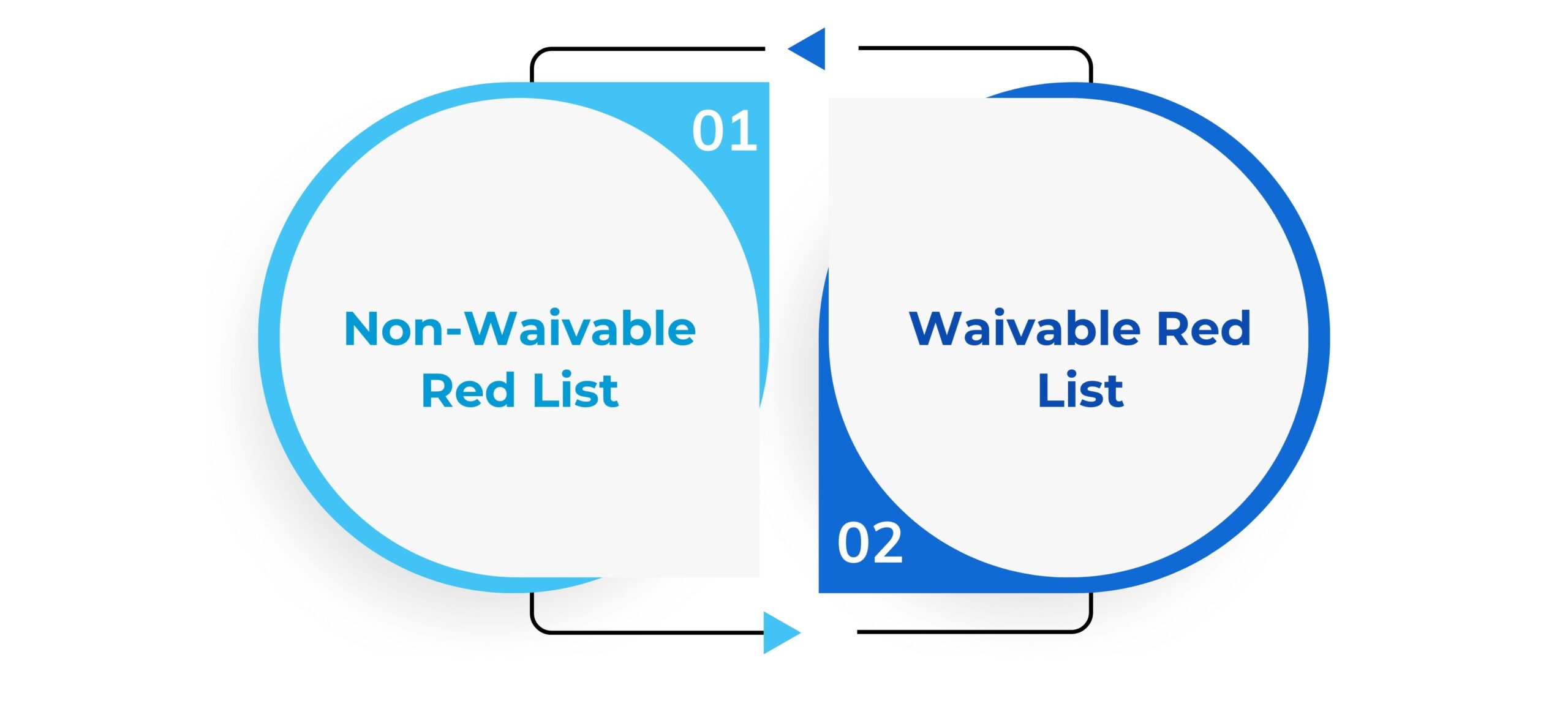
02 types of Red List
The Non-Waivable Red List covers situations that will inevitably give rise to a conflict of interest, requiring the arbitrator to refuse appointment in the case, even if the parties consent. This list is rooted in the principle that no one should be a judge in their own cause. Accordingly, the parties’ agreement cannot cure the conflict. It includes circumstances in which the arbitrator has a close personal relationship or a significant financial interest with one of the disputing parties, thereby compromising fairness, impartiality, and objectivity in the resolution of the dispute.
The Waivable Red List covers situations that may give rise to a serious conflict of interest between the arbitrator and the parties but are not so severe as to be irremediable.
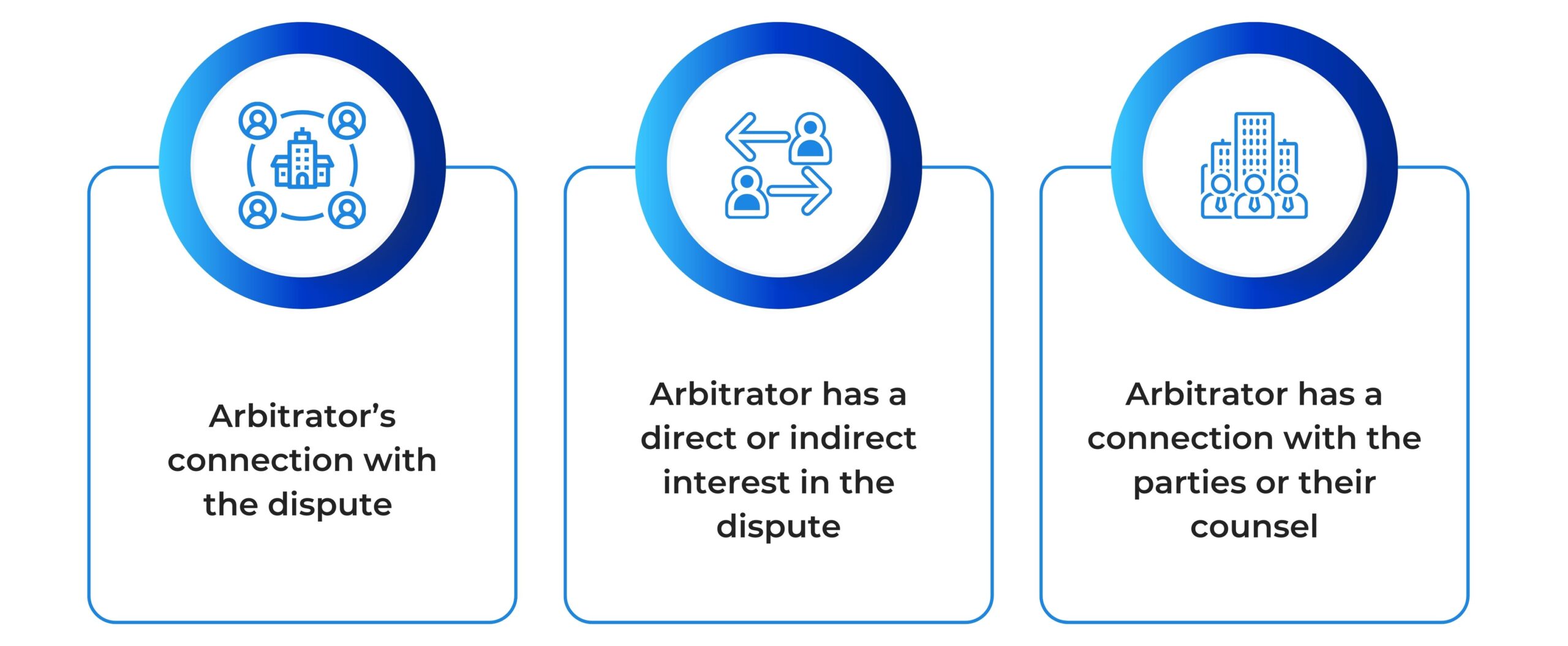
Situations of the Waivable Red List
In these situations, an arbitrator may only participate in resolving the dispute if they have the express and unequivocal consent of all parties, and the requirements of General Standard 4(c) are met.
It should be noted that the situations listed are non-exhaustive; therefore, sound judgment and careful consideration are advised when applying them to specific cases in practice. This open-ended approach is an advantage, as it prevents the omission of relevant scenarios and allows for flexible application. However, it may also create difficulties in determining whether a situation falls within the scope of the Red List.
Accordingly, when applying the Guidelines, states and territories are encouraged to clarify or issue supplementary guidance tailored to their own circumstances.
Orange List
The Orange List includes specific situations which, depending on the facts of each case, may give rise to justifiable doubts about an arbitrator’s impartiality or independence. The Orange List reflects the situations under General Standard 3(a), which require the arbitrator to disclose the relevant information.
Once the information is disclosed, the arbitrator may continue to serve and participate in the proceedings if no objections are raised by the parties. In all such cases, the parties will be deemed to have accepted the arbitrator if they do not object within 30 days after disclosure[9].
Objection is the only means that can lead to the disqualification of an arbitrator. If the arbitrator fails to disclose information, or the disclosed information reveals a potential conflict of interest but no objections are made, disqualification will not result. In other words, failure to disclose is not, by itself, a ground for removal.
An arbitrator has no obligation to disclose information unless it falls within a situation listed in the Orange List. However, arbitrators should still consider the potential for conflicts of interest and may disclose situations not listed in the Orange List to ensure fairness and objectivity.
Green List
The Green List is an open-ended list of specific situations where there is no conflict of interest, or no reasonable doubt about the possibility of such a conflict, from an objective standpoint. Therefore, arbitrators are not required to disclose these situations.
If an arbitrator does not disclose a situation on the Green List but a party later raises a complaint during the proceedings, the decision on arbitrator replacement shall rest with the remaining tribunal members. If they cannot reach a decision, the presiding arbitrator shall decide.
The Green List represents an effort to protect arbitrators from unnecessary disclosures that could create unwarranted complications. However, this is not an excuse for arbitrators to evade their minimum duties. In all cases, disclosure and the avoidance of conflicts of interest ultimately depend on the arbitrator’s conscience and good faith[10].
Conclusion
The 2024 IBA Guidelines on Conflicts of Interest in International Arbitration play a vital role in promoting transparency, fairness, and independence in dispute resolution. Through the seven General Standards and three lists (Red, Orange, and Green), the IBA provides a clear framework for identifying and addressing potential conflicts of interest. These provisions not only help arbitrators maintain impartiality but also respect the parties’ autonomy in arbitration. Although they are not legally binding, the IBA Guidelines serve as a valuable reference tool, fostering trust and efficiency in international arbitration practice.
Contact Us
For further information, please contact:
CNC Vietnam Law Firm
Address: The Sun Avenue, 28 Mai Chi Tho, Binh Trung Ward, Ho Chi Minh City, Vietnam
Phone : 028 6276 9900
Hotline: 0916 545 618
Email: contact@cnccounsel.com
Website: cnccounsel
We would be delighted to welcome you at CNC’s office, where you’ll have the opportunity to consult with the lawyer best suited to your circumstances. Of course, if you are unable to meet in person, simply email us via contact@cnccounsel.com or call us via (+84-28) 6276 9900.
It would be a pleasure for CNC’s lawyers to help you build a solid legal foundation, thus ensuring the success and sustainable development of your project!
Managed by
 |
Tran Pham Hoang Tung I Partner
Phone: (84) 901 334 192 Email: tung.tran@cnccounsel.com |
 |
Tran Anh Thy | Junior Associate
Phone: (84) 28 6276-9900 |
 |
Nguyen Thi Hong Nhung I Collaborator
Phone: (84) 347 924 900 |
[1] IBA Guidelines on Conflicts of Interest in International Arbitration 2024, page 5.
[2] IBA Guidelines on Conflicts of Interest in International Arbitration 2024, page 2.
[3] IBA Guidelines on Conflicts of Interest in International Arbitration 2024, page 2.
[4] 2024 IBA Guidelines on Conflicts of Interest in International Arbitration, https://www.acerislaw.com/2024-iba-guidelines-on-conflicts-of-interest-in-international-arbitration/, accessed 10/06/2024.
[5] The IBA Guidelines on Conflicts of Interest in International Arbitration, https://www.lcalex.it/en/the-iba-guidelines-on-conflicts-of-interest-in-international-arbitration/, accessed10/06/2024.
[6] General Standard 1, IBA Guidelines on Conflicts of Interest in International Arbitration 2024.
[7] General Standard 2, IBA Guidelines on Conflicts of Interest in International Arbitration 2024.
[8] General Standard 3a, IBA Guidelines on Conflicts of Interest in International Arbitration 2024.
[9] General Standard 4a, IBA Guidelines on Conflicts of Interest in International Arbitration 2024.
[10] Probity Deconstructed: How Helpful, Really, are the New International Bar Association Guidelines on Conflicts of Interest in International Arbitration?, Arbitration International, Volume 21, Issue 3, 1st September 2005, page 323-342.
Disclaimers:
This article has been prepared and published for the purpose of introducing or informing our Clients and potential clients on information pertaining to legal issues, opinions and/or developments in Vietnam. Information presented in this article does not constitute legal advice of any form and may be adjusted without advance notice.



